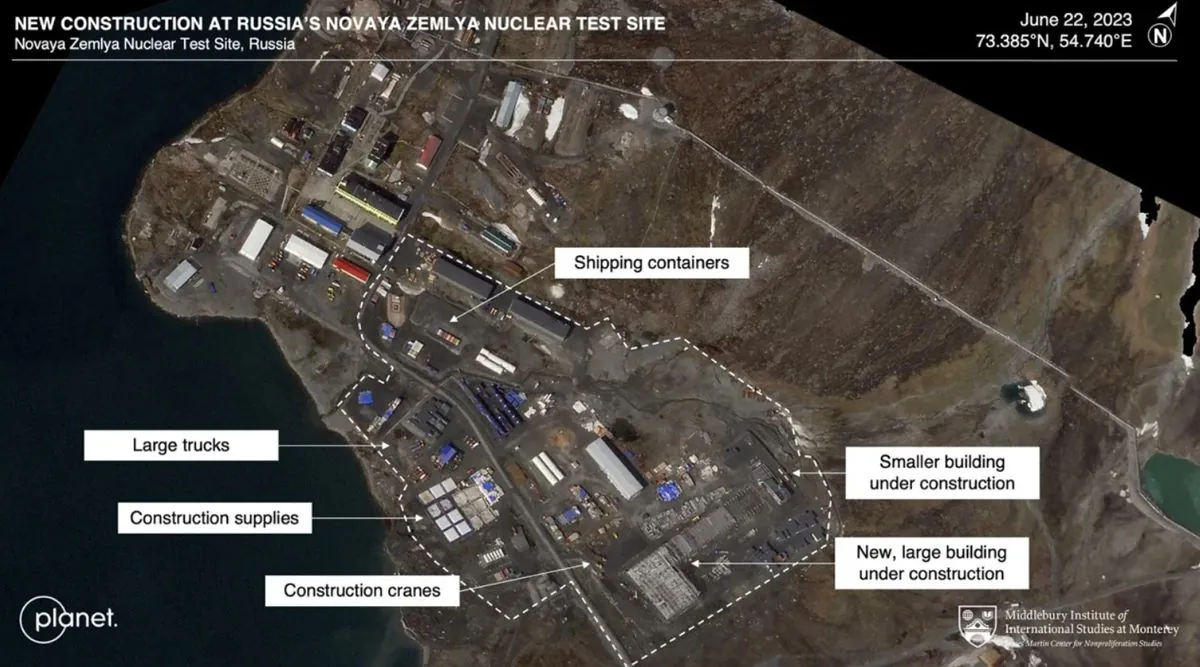In a statement reminiscent of Cold War-era nuclear diplomacy, Sergei Ryabkov, Russia's Deputy Foreign Minister, has affirmed that Russia will refrain from conducting nuclear weapons tests as long as the United States maintains a similar stance. This declaration comes amidst growing global concerns about the potential resumption of nuclear testing by major powers.
The pledge is particularly significant given recent developments at Russia's nuclear test site on Novaya Zemlya, an archipelago in the Arctic Ocean. Andrei Sinitsyn, the site's director, recently stated that the facility is fully prepared to resume large-scale testing if required. This readiness reflects a broader trend among nuclear powers, as the United States and China have also been upgrading their respective test sites in recent years.
Russia's position on nuclear testing is intrinsically linked to its perception of US actions. Ryabkov expressed alarm over reports of US mid-range missile systems deployed in the Philippines, indicating that Russia is considering various responses, including military options. This development underscores the ongoing tensions between the two nations, reminiscent of the 1962 Cuban Missile Crisis, which brought the world to the brink of nuclear conflict.
The current geopolitical climate, shaped by the ongoing conflict in Ukraine which began approximately 2.5 years ago, has exacerbated these tensions. The war has led to the most severe confrontation between Russia and the West since the Cold War era, raising concerns about the potential for nuclear escalation.
Historically, nuclear testing has played a significant role in international relations. The Soviet Union conducted its last test in 1990, followed by the United States in 1992. Since then, only North Korea has carried out nuclear tests in the 21st century. The global community has made efforts to curb nuclear proliferation, with the Comprehensive Nuclear-Test-Ban Treaty (CTBT) adopted by the UN General Assembly in 1996. However, in 2023, Vladimir Putin formally revoked Russia's ratification of the CTBT, aligning Russia's position with that of the United States.
The potential resumption of nuclear testing would mark a significant shift in global nuclear policy. It would usher in a new era of nuclear development at a time when Russia, the United States, and China are already engaged in modernizing their nuclear arsenals. This race for nuclear supremacy reflects the complex dynamics of a world where traditional power structures are being challenged.
"We can conduct such tests, but we will not conduct them if the United States refrains from such steps."
The history of nuclear testing is fraught with devastating consequences. The United States initiated the nuclear age in July 1945 with a test in New Mexico, followed by the atomic bombings of Hiroshima and Nagasaki in August of the same year. The Soviet Union joined the nuclear club in 1949 with its first test in Kazakhstan. Since then, nuclear testing has left a legacy of environmental damage and health concerns that persist to this day.
As the world watches these developments, the international community remains divided on the best approach to nuclear disarmament and non-proliferation. The Treaty on the Non-Proliferation of Nuclear Weapons (NPT), which entered into force in 1970, and the Nuclear Suppliers Group, founded in 1974, represent ongoing efforts to control the spread of nuclear technology and materials.
The current situation serves as a stark reminder of the continuing relevance of nuclear weapons in global politics and the potential consequences of their use or testing. As nations navigate these complex issues, the world holds its breath, hoping that diplomacy and reason will prevail over the specter of nuclear conflict.
